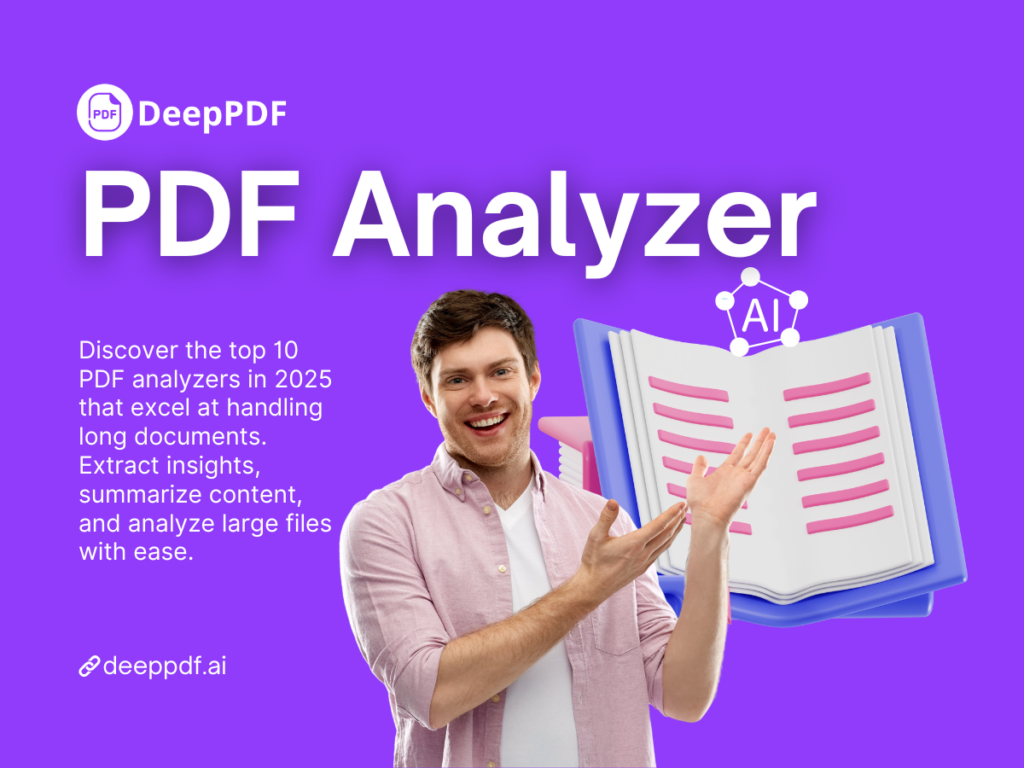In an era dominated by research-heavy workflows and information-dense documentation, the ability to process and comprehend long PDFs is no longer a luxury—it's a necessity. Whether you’re reviewing 100-page whitepapers, legal contracts, or academic journals, traditional readers and extractors fall short. That’s where a PDF Analyzer steps in.
A PDF Analyzer is a specialized tool designed to parse, understand, and summarize large PDF files. These tools often incorporate advanced AI models, enabling users to chat with a document, extract key insights, and even generate accurate summaries—effectively functioning as an intelligent PDF summarizer. In 2025, with LLMs (large language models) powering much of this ecosystem, these tools are more powerful and accurate than ever.
This blog ranks the top 10 PDF Analyzers for long documents in 2025, focusing on AI performance, user experience, summarization quality, and real-world usability. But first, let’s explore why such tools are crucial and what features matter most.
Why You Need a PDF Analyzer for Long Documents
Lengthy PDF documents—think 100 pages or more—are everywhere: technical manuals, legal filings, scientific articles, market reports, eBooks, and government publications. These files often hold vital data buried within dense paragraphs and complex structures.
Traditional PDF viewers are simply not designed to handle deep content interaction. You can scroll, search, and maybe copy/paste. But if you're looking to extract meaningful insights or engage with the document intelligently, you need an AI-powered solution.
Here’s why a dedicated PDF Analyzer matters:
- Time Efficiency: Instead of reading through 200 pages manually, AI can instantly identify key points, summarize chapters, or answer your specific queries.
- Context Awareness: Unlike CTRL+F, a modern PDF Analyzer can understand semantics, not just keywords. Ask a complex question, and it will pull from multiple relevant sections.
- Long-Context Support: Many PDFs exceed the context window of traditional tools. Advanced analyzers leverage high-token-capacity LLMs to process long documents end-to-end.
- Citations and Traceability: Some tools provide source-backed answers with clickable references—critical for academic and legal use cases.
- Multilingual & Global Use: PDFs in French, German, Chinese? No problem. Many analyzers now support translation and multilingual summarization.
In essence, a powerful PDF Analyzer transforms your passive documents into active knowledge engines.
Key Features to Look for in a Long-Context PDF Analyzer
Choosing the right PDF Analyzer for long documents requires more than looking at basic specs. Here are five essential features that differentiate a mediocre tool from an exceptional one:
Handles Full-Length PDFs Without Truncation
One of the most common issues with average PDF tools is their inability to handle long files. A high-quality PDF Analyzer should support documents with hundreds of pages, maintaining full structural integrity and context awareness.
In 2025, this often means using LLMs with large token limits (e.g., 100K+ tokens). Without this, you risk truncated content, loss of detail, or incomplete summaries.
Built on High-Quality LLMs with Accurate Summarization
A good PDF Analyzer is only as good as the language model powering it. Tools built on GPT-4, Claude, Gemini, or other frontier models deliver more coherent, human-like summaries and semantic search.
Look for tools that offer:
- Multi-paragraph, section-wise summarization
- Question answering that’s consistent with the full context
- PDF summarizer outputs that reflect nuance, not just keywords
In-Line Citations with Clickable, Traceable Sources
Especially in academic, medical, and legal work, it’s not enough to summarize. You need evidence. Advanced PDF Analyzers in 2025 now feature in-line citations that are clickable—so you can verify where the answer came from.
This is essential for:
- Verifying facts and figures
- Citing your sources properly
- Avoiding AI hallucination
Seamless and Non-Technical User Experience
Even the most powerful PDF Analyzer is useless if it’s hard to use. The best tools offer:
- Drag-and-drop interfaces
- Real-time PDF chat
- Auto-summary buttons
- Clean UI with minimal distractions
A streamlined experience ensures that students, professionals, and researchers alike can gain insights without technical roadblocks.
Top 10 PDF Analyzers for Long Documents (2025 Review)
After weeks of testing across academic papers, whitepapers, technical manuals, and full-length eBooks, here’s a real-world take on the most popular PDF Analyzers for long documents in 2025.
1. DeepPDF – A Heavyweight PDF Analyzer for Researchers and Professionals
DeepPDF doesn’t play around. The first time I uploaded a 180-page energy sector whitepaper, it loaded quickly and understood my follow-up questions across multiple sections—without losing context. This is rare.
Its AI chat interface is refreshingly fast and handles nested questions well. I also appreciated the built-in translation tool, which kept the original meaning intact across Chinese, German, and French documents. That said, the interface feels a bit too "engineering-focused"—there’s no visual polish, and beginners may find it clunky.
But for sheer power and accurate source-based responses, DeepPDF PDF Summarizer is the most capable PDF Analyzer for professionals who don’t need hand-holding.
Real Verdict: Not pretty, but deadly accurate. Best for technical users who value depth over design.
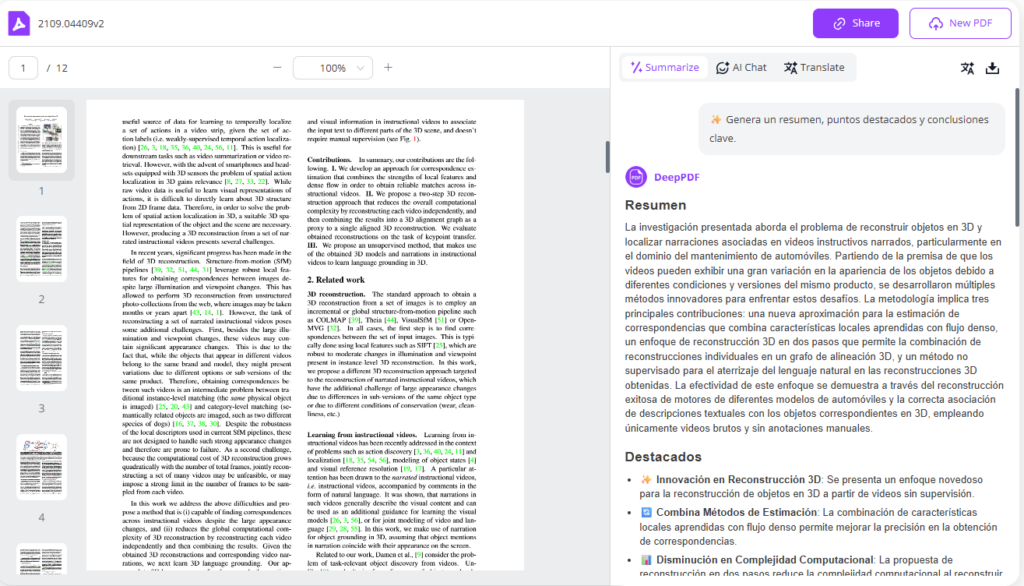
2. NoteGPT – Surprisingly Good, Especially for Free Users
I wasn’t expecting NoteGPT to be this good. It handles long PDFs with ease—even my 240-page policy report uploaded on mobile was parsed accurately, and the AI chat gave usable, human-like answers. What’s more, I could instantly switch between summarizing, translating, and asking questions, without any reloads or waiting spinners.
The summaries are editable, and the “one-click insights” often catch points I would’ve missed on a skim. The biggest surprise? It’s completely free and doesn’t require login, which makes it one of the most accessible PDF Analyzers right now.
It lacks source-linked citations for now, which might be a deal-breaker for academic users. But for most people who just want to understand or extract ideas from long documents, NoteGPT is a solid, no-frills solution.
Real Verdict: Perfect for students, bloggers, and report readers. And it won't ask you to sign up or pay after 3 uses.
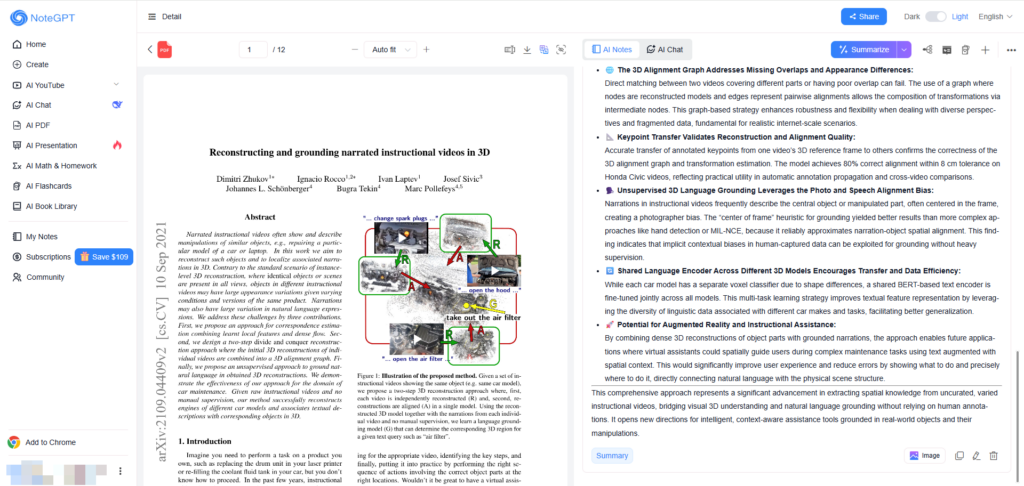
3. Smallpdf – Great UI, But Feels Like AI Was Duct-Taped On
Smallpdf has been around forever as a conversion tool, so I was curious to see how it fares as a PDF Analyzer. The result? Underwhelming for long documents.
I uploaded a 130-page HR policy document. The AI summary came back with generalizations like “This document is about employee responsibilities.” Well, thanks, Sherlock.
The interface is beautiful—no surprise there—but the summarizer seems built for short, simple files. It’s not a long-context analyzer at heart. There's no interactive chat, no citations, and no memory across sections.
Real Verdict: Think of this as a PDF compressor that occasionally moonlights as a summarizer. Good for surface-level scans, not deep reading.
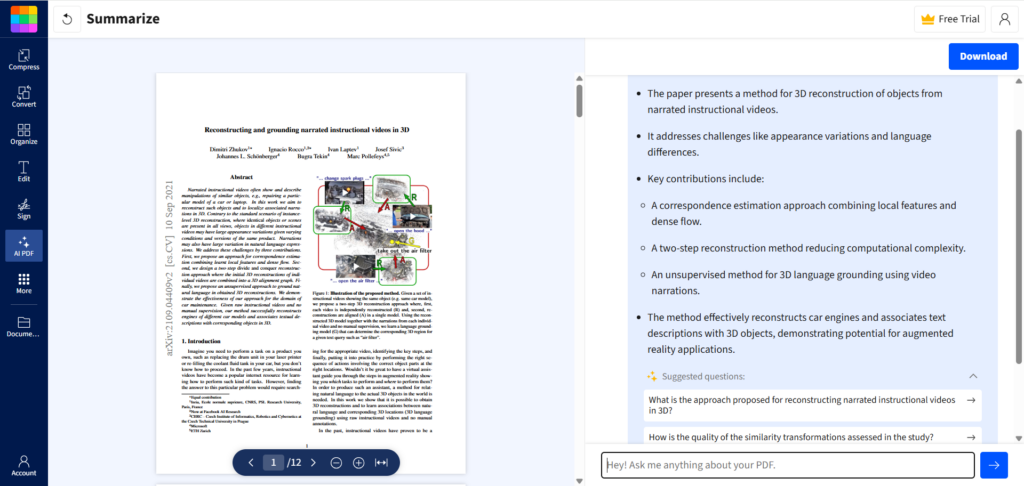
4. ChatPDF – Quick Answers, but Gets Tired Midway
ChatPDF is often one of the first tools people try, and for good reason: it’s simple. Upload a PDF, ask a question, and get an answer. When I tested it with a 90-page research report, it did well for the first few queries. But then, it began repeating itself and forgot the context of earlier questions.
One quirk I found was its tendency to summarize sections I hadn’t asked about. And unlike more advanced PDF Analyzers, ChatPDF doesn’t let you trace where the answers come from, which is a problem if you’re dealing with citations or legal text.
That said, for casual reading—say, you want to quickly find a statistic or check an author’s conclusion—it’s decent. Just don’t expect it to hold a multi-step conversation.
Real Verdict: Friendly and fast, but like a chatbot with short-term memory loss. Use it for light-duty PDFs.
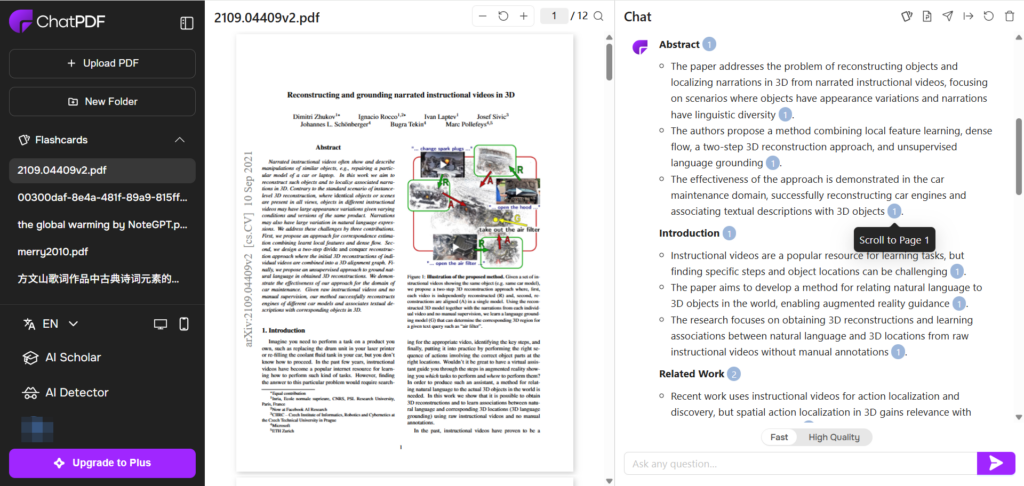
5. Monica.im – Works Well, but Tied to Chrome Extension Ecosystem
Monica.im is a browser-based assistant that lets you analyze long PDFs without switching tabs. I tested it on a full-length industry outlook from Deloitte, and it answered surprisingly well, even referencing visuals from the document. However, its performance depends heavily on the Chrome extension—so if you’re not in that ecosystem, it’s less practical.
One standout feature: it gives direct source previews when you hover over responses. That's incredibly helpful if you want to verify claims quickly, which not all PDF Analyzers offer. However, the chat formatting isn’t optimized for dense responses, and sometimes the replies get truncated or overloaded.
Real Verdict: Great for web readers and multitaskers. Just be ready for Chrome lock-in and some display quirks.
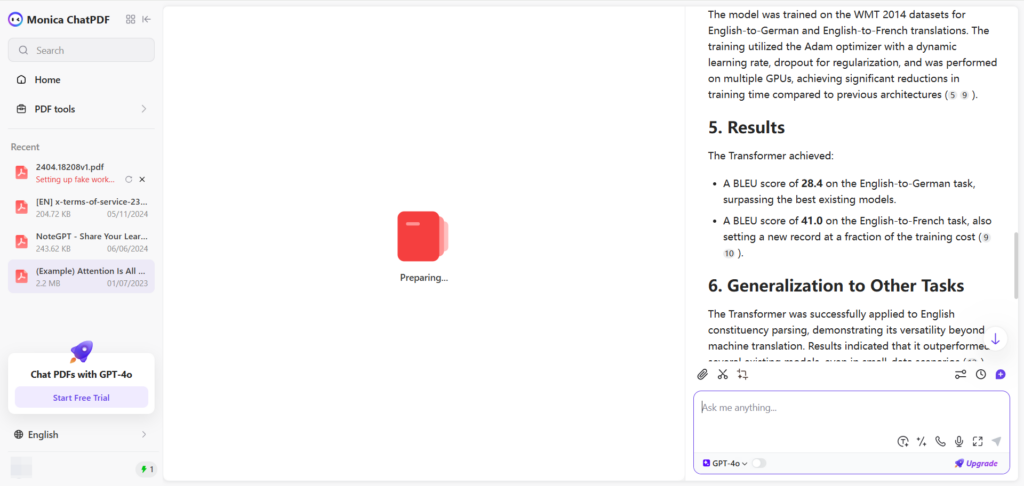
6. Sider.ai – PDF Analyzer Disguised as a Chrome Plugin
Sider.ai is more like a Swiss Army knife for people who live in Chrome. It’s not just a PDF Analyzer—it’s also a ChatGPT sidekick, search enhancer, and summarizer. I tested it on a 100-page PDF thesis and appreciated the sidebar interface, which allowed me to ask questions while viewing the original page.
That said, there’s a learning curve. If you’re expecting a drag-and-drop PDF chat experience, Sider feels a bit... clunky. It sometimes splits PDFs incorrectly, and I had to re-upload the same file twice to get it to recognize all the pages.
One upside is its real-time citation linking (when it works), but don’t expect academic-grade summaries. This PDF Analyzer is more suited for web researchers, marketers, or productivity nerds who want their tools inside Chrome.
Real Verdict: Versatile but scattered. Feels more like an AI dashboard than a dedicated PDF Analyzer. You’ll either love it or bounce off in 5 minutes.
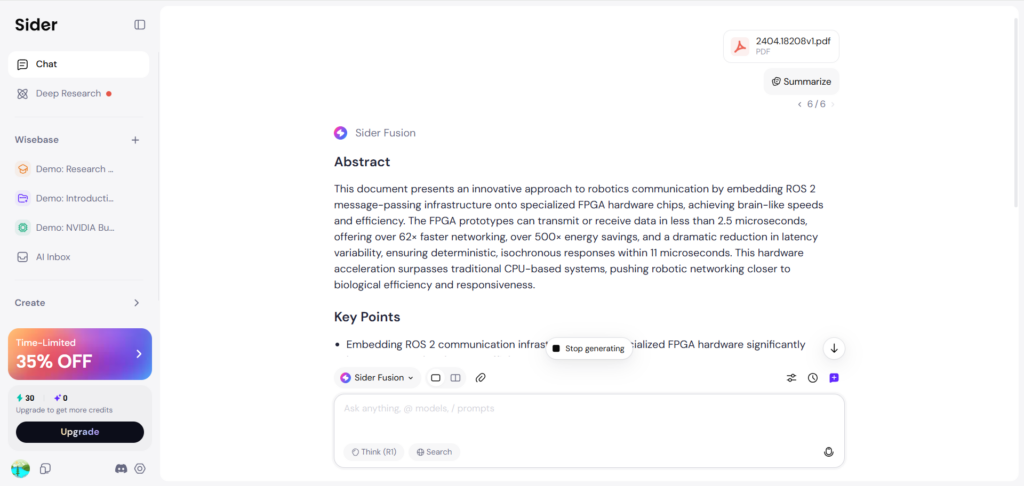
7. SciSpace – The Best PDF Analyzer for Academic and Scientific Papers
If you’ve ever tried reading a Nature paper at 2 a.m., SciSpace is your new best friend. It’s purpose-built for scientific PDFs—those with diagrams, citations, multi-layered jargon—and it does a remarkably good job explaining them in plain English.
I uploaded a 70-page AI research preprint from arXiv, and SciSpace gave me clean, citation-backed explanations. Its “Ask AI” feature is more focused than most, and it pulls from the actual content—not just a summary layer.
Downsides? It doesn’t love non-scientific documents. I tried a business whitepaper, and the answers were robotic and vague. Also, it limits the number of free questions per document unless you upgrade.
Real Verdict: Easily the smartest PDF Analyzer for academic work. But don’t expect miracles with marketing decks or casual PDFs.
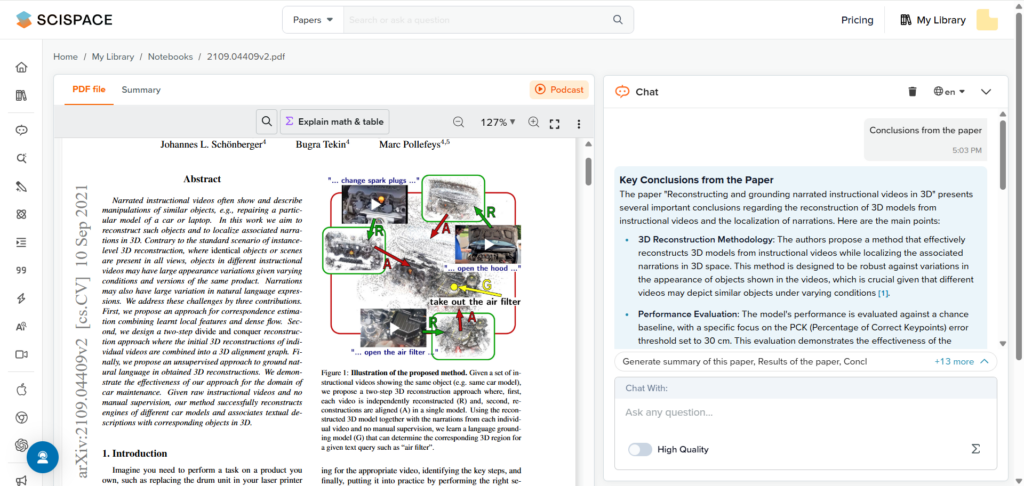
8. AskYourPDF – Powerful Engine, Weak on UX
AskYourPDF caught my eye with its claim to handle large PDFs using OpenAI’s GPT. And it does deliver—technically.
I uploaded a 250-page technical standard document, and it managed to find fine-grained answers buried in obscure sections. It clearly parses full context well, which places it in the top tier of long-document PDF Analyzers. But the interface? It’s dated, a bit laggy, and not built for conversation.
The lack of formatting or follow-up threading makes deep chats awkward. Still, if you care about what it can do more than how it looks while doing it, this one’s a solid choice.
Real Verdict: A brute-force PDF Analyzer. Smart under the hood, but not winning any design awards.
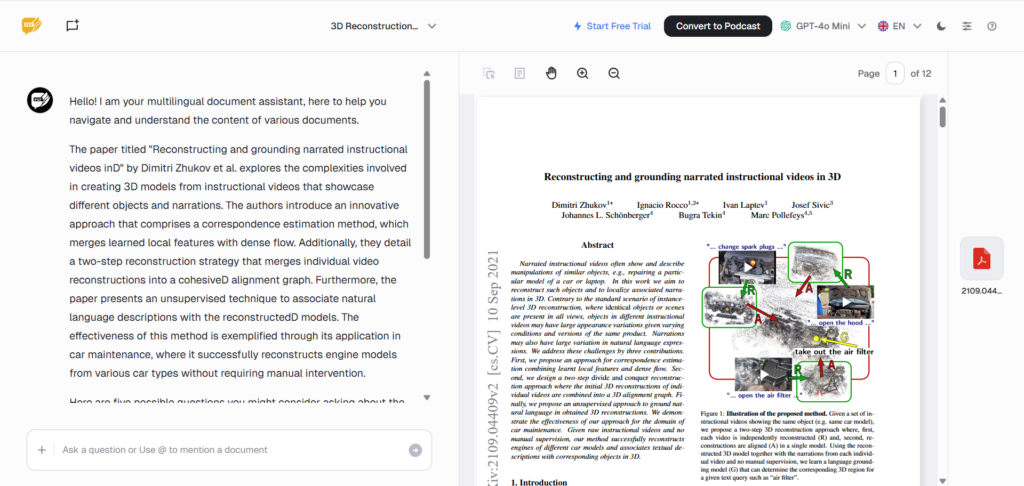
9. HiPDF – Toolbox First, Analyzer Second
HiPDF is better known as a PDF utility suite—compress, convert, merge, OCR, etc. Its AI features, including summarization and Q&A, are recent additions. So I was skeptical going in.
Turns out, for shorter business documents (under 100 pages), its summarizer works decently well. But for long documents? Not really.
I tested it on a 190-page annual financial report. It gave me a summary so vague I wasn’t sure if it had read the whole file or just scanned the title page. Also, there's no real-time chat or interactive follow-up—it’s more of a summarizer than a full-fledged PDF Analyzer.
Real Verdict: Great if you’re already using HiPDF for conversions. As a long-document analyzer? Meh.
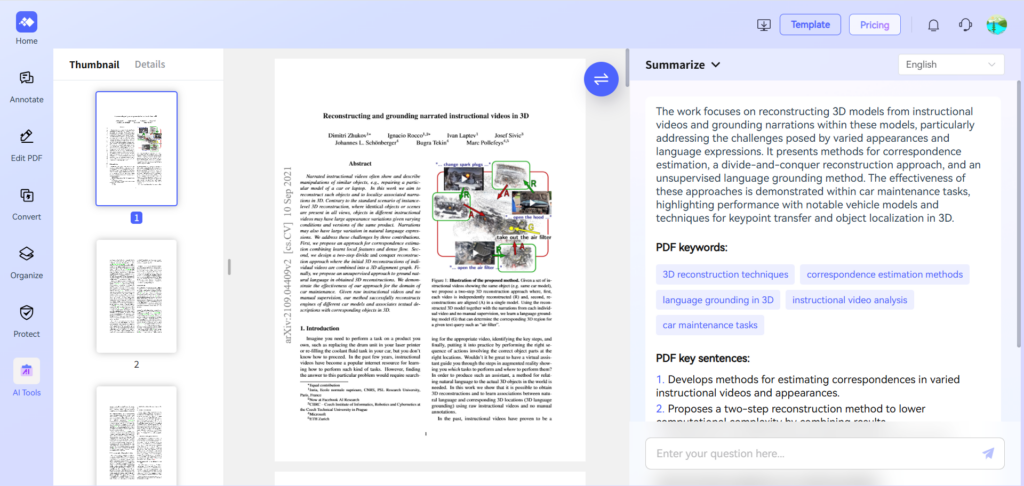
10. NotebookLM – Google's Brainy But Still in Beta
NotebookLM is like Google’s nerdy experiment. It lets you upload PDFs, websites, and notes, and then asks the AI to synthesize insights. When I threw a 120-page trend forecast at it, I was impressed: the AI linked different themes together, pulled quotes, and gave me insights across multiple chapters.
But it's also inconsistent. Sometimes, it misinterpreted what I meant by “key trend,” returning a literal list of subheadings. And it doesn’t work well with scanned or image-based PDFs.
Still, it’s one of the few PDF Analyzers that actively tries to connect ideas, rather than just summarizing them.
Real Verdict: For researchers who want “smart thinking” more than just summarization. Still a work in progress, but promising.
Comparison Table: PDF Analyzers for Long Files
| Tool | Long PDF Support | AI Chat | Summarization | Citation Linking | Translation | Best For |
| DeepPDF | ✅ 100+ pages | ✅ | ✅ | ✅ | ✅ | Researchers, analysts |
| NoteGPT | ✅ 100+ pages | ✅ | ✅ | ❌ | ✅ | Students, professionals |
| Smallpdf | ⚠️ Limited | ❌ | ✅ (basic) | ❌ | ❌ | Casual users |
| ChatPDF | ✅ | ✅ | ✅ | ❌ | ❌ | Fast lookups |
| Monica.im | ✅ | ✅ | ✅ | ✅ | ❌ | In-browser use |
| Sider.ai | ✅ | ✅ | ✅ | ❌ | ❌ | Cross-tab reading |
| SciSpace | ✅ | ✅ | ✅ | ✅ | ❌ | Academic researchers |
| AskYourPDF | ✅ | ✅ | ✅ | ✅ | ❌ | Legal and policy documents |
| HiPDF | ✅ | ✅ | ✅ | ❌ | ✅ | All-purpose users |
| NotebookLM | ✅ 200+ pages | ✅ | ✅ | ✅ | ❌ | Writers, note-takers |
How We Tested These Long-Context PDF Analyzers
To determine the best PDF Analyzer tools of 2025, we followed a structured evaluation framework:
- Document Scope: Tested each tool on PDFs ranging from 50 to 300 pages, including scientific papers, contracts, and whitepapers.
- Question Accuracy: Asked detailed questions across sections to assess understanding and consistency.
- Summarization Quality: Evaluated if the summary captured key ideas, structure, and tone.
- Citation Precision: Checked if answers linked back to original passages when applicable.
- Speed & UI: Measured load time, response time, and ease of use for non-technical users.
Each tool was tested multiple times under different conditions (e.g., academic vs business documents) to ensure consistency.
Conclusion
As someone who lives inside long documents—whitepapers, studies, pitch decks—I can say that not all PDF Analyzers are created equal. If you want power, DeepPDF and NoteGPT are top-tier. For academic papers, SciSpace is unmatched. If you just want something casual and easy, ChatPDF might suffice.
Whatever your choice, the key is understanding your own workflow. Do you need clickable citations? Full-context Q&A? Translation? Batch processing?
In 2025, there are more options than ever—but also more fluff. Hopefully, this guide has helped cut through some of the noise and pointed you to a PDF Analyzer that actually fits the way you work.
And if you’re still just scrolling to find “the best free PDF summarizer” — try DeepPDF first. It may surprise you.
